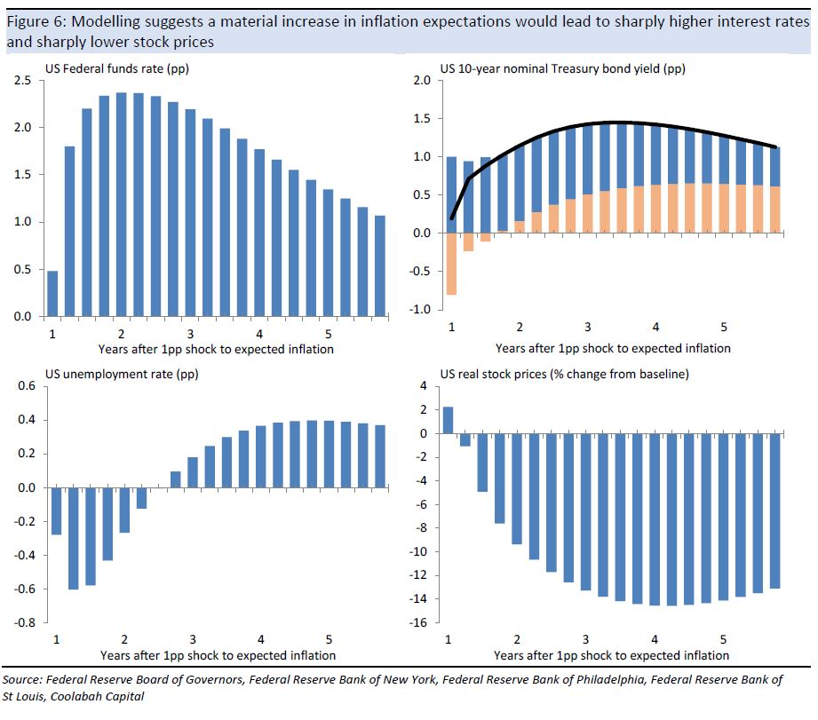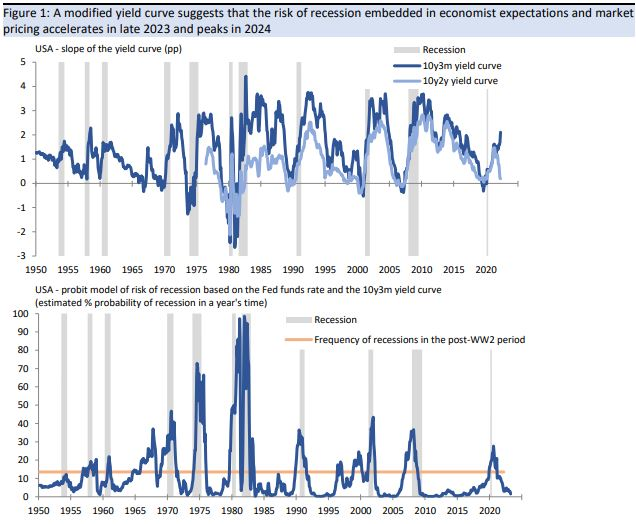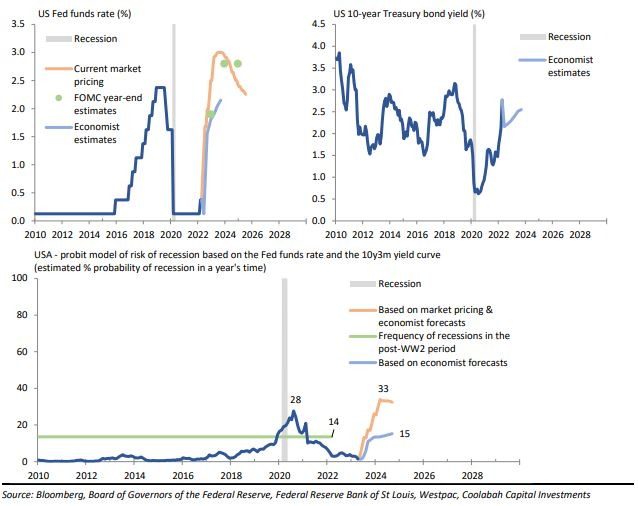Why US equities could fall at least another 20-35% (and the NASDAQ could be much worse)...
US equities have fallen 14%-23% (S&P500 and NASDAQ) since we publicly revealed our bearish outlook on the market and many other correlated asset-classes, including credit, crypto and fixed-rate bonds (or duration). We expect the spectre of a US recession in 2023/24 to continue to apply downward pressure on equity valuations, and are looking for an additional S&P500 correction of at least 20-35% to restore price/earnings multiples to more normal levels. There are some parallels with the 2001 tech-wreck, which led to a US recession. In the 2001 correction, the S&P500 price index slumped 49% while the NASDAQ price index lost 78%.
Back in December we published forecasts (reiterated in January here and here) stating that we expected the S&P500 to fall some 30%-60% as 10-year government bond yields in the US surged from 1.3% (at the time of writing) to north of 3.2%, which was the peak last observed in 2018 when the Fed hiked its cash rate to around 2.5%.
We wrote that the initial catalyst would be a repricing of interest rate expectations in the US to shift to a terminal Fed cash rate of between 2.5% to 3.0%. At the time, the US terminal cash rate pricing was absurdly low at just 1.3% and the market was only expecting 3 hikes in 2022. We countered that the Fed should hike at least 6-7 times this year, targeting a terminal cash rate of 2.5-3.0%. The US terminal cash rate pricing has now leapt to ~2.8%, broadly in line with both the moves in the US 10-year government bond yield and our central case. The market has also priced in an ultra-aggressive front-end loading of these hikes, jumping from pricing in just 3 hikes for this year in December 2021 to more than 10 hikes at present.
US equities have been slammed as a consequence. The S&P500 price index has lost 14% from its peak in December 2021 while the NASDAQ composite index is down 23% from its late 2021 apogee. While the buy-the-dip (as opposed to sell-the-rip) global equity investor reflex has remained relatively strong in 2022, recent data demonstrating that earnings expectations for US corporates are far too optimistic has compelled a negative re-rating of equity valuations. On Friday night, US wages growth once again surprised on the upside, underscoring the risk of a wage/price spiral and the problems US firms are facing with their labour costs and margins.
In May 2021, we presented modelling looking at the impact of a modest increase in inflation expectations in the US, which we showed could slash real equity valuations by 15% as the Fed's cash rate increased by ~250 basis points. Consumer inflation expectations have risen much more sharply than the 1 percentage point change in market inflation expectations that our analysis assumed. The key charts from that piece is enclosed below.

This month we published additional research showing that there appears to be a reasonably high likelihood of a US recession in late 2023 or early 2024 based on the market and economist expectations for future interest rate increases (see the charts immediately below). While talk of a US recession remains subdued right now, we think that this will ramp-up over time and compel price/earnings multiples to mean-revert back to their post-tech wreck and pre-pandemic range. The key conclusion from our April analysis was as follows:
The estimated probabilities based on market pricing of the funds rate are higher and would strongly signal a recession in late 2023/2024, if realised...The eventual risk of recession will also hinge on how much the 10-year bond yield increases, noting that it is already materially above the peak economists’ forecast of 2.6% (current US 10-year yields are 2.8%).


Although US equities only slumped 20% in 2018 as 10-year yields soared above 3.2%, we believe that this cycle is very different because core inflation, wages growth, and inflation expectations in the US are running at multiples their 2018 levels. Acute global military conflict risks are not helping either.
Concurrently, post-pandemic asset prices have become much more stretched as investors naively priced in the low-rates-for-long paradigm in perpetuity. In 2021, investors were assuming (hoping) that the US 10-year government bond yield would remain around 1%-1.5% over the long-run, which helped rationalise uber-lofty equities and property valuations, amongst other things.
Way back in March 2021, we released research showing that the S&P500's unusually elevated cyclically-adjusted price/earnings multiples (developed by Nobel prize winner Robert Shiller), which were sitting at their second-highest levels over the last circa 140 years of data, implied that there was a high risk of a US recession. Specifically, we wrote:
US equities are extremely expensive according to long-term valuation measures such as the cyclically-adjusted PE (CAPE) ratio. The CAPE ratio for the S&P500 is currently about 35, which is the second-highest level in the roughly 140 years for which there are data...The US stock market's current CAPE points to a high risk of either a significant market correction or sustained market underperformance. In turn, this raises the risk of a spillover to other advanced economies given most other equity markets have a high correlation with US share prices.
We think that there is a reasonable prospect that the S&P500's cyclically-adjusted P/E will normalise back into a 20-25x range, with the risk it falls further down towards 10-15x. In our central case, we expect that the S&P500 will continue to correct, losing at least another 20%-35% as US recession risks become fully priced.
The risks are skewed towards materially larger losses if P/Es revert back towards longer-run averages around 10-15x. There are arguably parallels here with the 2001 tech-wreck (and the associated mispricings), which led to a US recession. In the 2001 correction, the S&P500 price index slumped 49% while the NASDAQ price index lost 78%.

All of these risks are amplified by the fractured global geo-polity and the possibility of another "world war" between the major powers cleaved by Western democracies, such as the US, UK and Australia, and non-democracies, the most obvious candidates of which are the firmly allied Sino-Russian axis. We have published advanced statistical modelling using 160 years of data, and an interactive website at predictingwar.com, which puts the probability of a kinetic US-China conflict, including a declaration of war, at a worryingly high ~45% over the next 10-years.
POSTSCRIPT:
I've got quite a bit of positive feedback on the note above, but one reader, Michael, really takes the cake. In two decades of writing for newspapers, this is one of the best responses I have ever received in terms of sheer ingenuity. I love it! Enjoy...
I do love to receive your highly opinionated material, Chris. It’s a refreshing break from the attempts at objective commentary that parades as genuine information out in the marketplace.
Here’s a slightly different outlook (bearing in mind I have zero capacity/authority compared with your organisational and personal capabilities/resources)..
What if we enter a period of massive growth, powered by outrageous government expenditure, based on a completely different mindset for the role of government?
High inflation is an inevitable outcome, but inflation is not entirely negative. Yes, wages rise, but so does capacity for consumption by the citizenry. Yes, businesses with debt at the margins will fail, but others will willingly lay out cash for the carcass, and benefit from doing so.
Businesses will be constrained for growth by debt capacity constraints, but government funding/subsidy and contracts will allow the largest to benefit from massive cashflows, with potential for redeployment of those disenfranchised by the changes.
Interest rates rise, but that favours savers, who feel better capable of dealing with an uncertain future, allowing them to better allocate capital between short and longer term objectives, and these folks hold the purse strings of the greater bulk of any nation’s finances (I’m making a leap of faith on objective capacity here, but let’s assume those with the biggest chunks of capital have access to, and take advantage of, better levels of higher-level advice on such issues).
Globalisation retreats as nations seek greater self-reliance, but this leads to pods of more cohesive “coalitions of the willing” and potentially a series of microcosm reflections of amoeba globalisation replications?
People defer expenditure out of fear, but the balance is made up with government expenditure through social initiatives, military upgrades, IT warfare upgrades, industrialisation re-capacity generation, energy self-reliance programs, and climate change initiatives? Governments are abject failures at prudent capital allocation – but if Smith’s animal spirits are allowed to scrape the battlefields of efficiency engagement then mayhaps there’s sufficient genuine productivity leaps to gain the GDP lifts required to make it all bake a seriously good pie?
In Australiana (as opposed to Perth – we’ve yet to anticipate in the Sydney residential property mania) we let loose the racist straps that constrain our ability to accept the globe’s disenfranchised skilled/wealthy and find ourselves leaping from one constraint to another as we navigate our ridiculously lucky national resource/skill set, and find global folk quite like our Hobbit-induced stability and regional fortunes, and the tiny existing population benefit at stupid levels from being the one place on the globe that’s still good to park an electric car in the garage. Who knows? The future is unwrit.
I understand that my proposition is ridiculous at so many levels. I’ve been waiting for inflation to hit for some time now – but expected it to come from Chinese deflation moving to inflation as their massive industrial complex moved to satisfy increased domestic demand, and higher global access pricing lifted non-Chinese inflation.
Who would have thought protectionism would follow a pandemic, in a rhythmic (rather than rhyming) repeat of the 20thC? Not me.
Simply mean reversion puts the NASDAQ et al down 40-70%% from peak to trough but we all know history isn’t a complete replication – it’s more of a “vibe” thing.
3 topics

